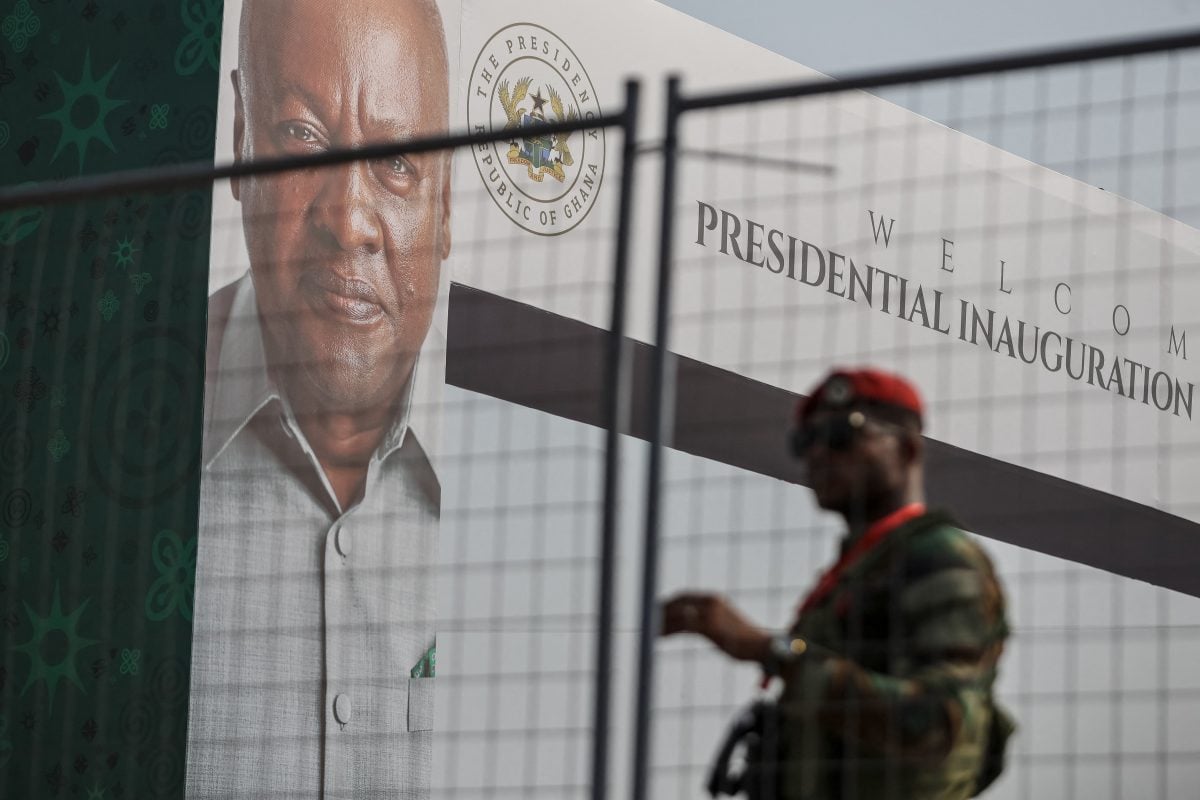In December, John Mahama was elected president of Ghana with 57% of the vote, a decisive victory for his National Democratic Congress. For Mahama, the victory represents a return to the highest office following his previous stint as president from 2012 to 2017.
Mahama’s reelection indicates a desire to emerge from the economic turmoil that followed the country’s 2022 debt default, which was triggered by years of runaway expenditure. The default led to extended negotiations with international lenders over a $13bn debt restructuring, culminating in a $3bn IMF bailout. The fallout has hit the population hard, with poverty climbing to 30%, according to the World Bank, and consumer inflation hitting 23.8% year on year in December.
In a speech at his 7 January inauguration, Mahama cast his victory as a demand to improve citizens’ living standards.
“They [Ghanaian citizens] have openly voiced their dissatisfaction through the decisive action they undertook at the recent polls…Our people also understand that democracy is not just a token adorned with periodic elections followed by pomp and pageantry when a new government is established. They expect that if democracy is celebrated as a superior means of governance, its outcomes must be more tangible and benefit their individual lives,” said Mahama.
In the speech Mahama vowed to initiate governance reforms and restore confidence in leadership. Jervin Naidoo, political analyst at Oxford Economics Africa, said that accountability will be a key goal of the administration.
“President Mahama has appointed a very special committee on accountability and corruption to assist, so I think the first thing is they’re going to take stock of what the previous government has said and done and then take it from there.”
Mahama said his government will focus on key four areas: economic restoration; improvement of the business/investment environment; governance and constitutional reforms; and accountability and the fight against corruption.
“The NDC will be more interventionist towards bolstering growth than the NPP: public discontent over poor living standards and public-sector working conditions continues nationally and there will be a short honeymoon, if any,” said Alex Vines, director of the Africa programme at Chatham House.
“The inheritance is tough – and putting Ghana back on a sounder fiscal footing will take time. Ghana’s reliance on essential imports and boosting job creation will improve over time, but near-term progress will be stunted,” he added.
The 24-hour economy
One of Mahama’s most high-profile pledges is his bid to build a “24-hour economy” in order to boost employment and unlock the potential of industry.
The president said the initiative is a “a deliberate policy to encourage and support businesses and public organisations to operate 24/7 in three shifts of eight hours to boost production, promote productivity and generate well-paying jobs… aimed at transforming Ghana into an import substitution and export-led economy.”
The idea is that with increased activity more jobs can be created, in particular in non-traditional hours.
As well as focusing on traditionally strong sectors like agriculture and agribusiness, the 24-hour economy will be unleashed at public institutions with a large customer base, including ports and harbours, customs, the passport office and the vehicle licensing agency, the government says.
After a period of austerity in the aftermath of Ghana’s debt default in 2022, the 24-hour economy joins pledges in education, public health, and infrastructure which are likely to require government investment.
To try to stimulate greater activity in the private sector, Mahama has also suggested he would expand credit for small and medium-sized enterprises and create more business incubators.
He also pledged to bring back the “Jobs for Youth” scheme to boost employment among young people, and to halt the controversial imposition of VAT on essentials such as food and petrol in order to ease cost of living pressures.
Dealing with the IMF
The pledges to increase spending could mark a change of direction as the previous government sought to cut public spending and increase tax revenues as part of the IMF’s $3bn bailout to help Ghana restore macroeconomic stability and ease the country’s debt burden.
There are therefore question marks regarding the extent to which Mahama will be able to implement his plans under the current agreement.
Naidoo said that the president would seek ‘wiggle-room’ for extra spending under the existing IMF programme.
“He’s going to try and get legislation in place to get the 24-hour economy going and he’s already started seeing what wiggle room he can have with the IMF, regarding the IMF project loans,” said Naidoo.
Vines says that there will be limited room for manoeuvre when it comes to renegotiation of the IMF deal.
“The government will have no choice but to continue to work with the IMF – the $3bn IMF extended credit facility underpins much of its finances and runs until mid-2026,” he says.
Following the election result, S&P Global Ratings predicted that despite the president’s wish for greater spending, the result “implies smooth transition and policy continuity in Ghana.”
“The incoming president has expressed a desire to rebalance fiscal consolidation – shifting toward expenditure cuts and away from revenue mobilisation…Given the constraints on accessing commercial financing, and a preference for both a stable exchange rate and additional build-up in foreign reserves, the incoming administration appears committed to maintaining tight fiscal and monetary policies, while putting its own stamp on specific government spending programs.”
Mahama told Bloomberg as recently as November that he would try to renegotiate the terms of the IMF bailout.
“We need to look at how we can refinance some of this so that we smoothen out the trajectory of the debt repayments,” he said.
But S&P believes the government will stay the course.
“The NDC has said it will continue to comply with the conditions set as part of Ghana’s three-year IMF Extended Credit Facility program, which include meeting ambitious primary budgetary targets.”
Great expectations
Elsewhere, Mahama has pledged to increase the role of women in public life. In his campaign manifesto, Mahama said that he will mandate a minimum 30 per cent quota for women in all political appointments. He quickly moved to appoint Jane Naana Opoku-Agyemang as vice president, the first time the role has been held by a women. He has also pledged to establish a Women’s Development Bank – a “special-purpose bank run by women to support women-owned and women-led businesses with low-interest loans and other tailored financial services on very flexible terms”.
A “Women in Agriculture” initiative will promote young women’s participation in agriculture by expanding access to land in agricultural zones and offering financial support.
With expectations higher than ever, Mahama’s promises to address economic hardships and improve governance while complying with a tough IMF deal are likely to be closely monitored.
“A large and stable NDC majority will aid smooth policymaking and the passage of reforms through parliament – this will make policymaking much easier than under the previous government, but the poor state of the economy and the debt (inherited also from Mahama’s first term), give limited room for delivering on expectations in the short term.” says Vines.
– Additional reporting by Harry Clynch
Want to continue reading? Subscribe today.
You've read all your free articles for this month! Subscribe now to enjoy full access to our content.
Digital Monthly
£8.00 / month
Receive full unlimited access to our articles, opinions, podcasts and more.
Digital Yearly
£70.00 / year
Our best value offer - save £26 and gain access to all of our digital content for an entire year!

 Sign in with Google
Sign in with Google 



